"Stonehouse Creek" is one of the best albums I have come across while looking out for bands in all things TDATS. Recently tracking down an original copy has encouraged me in my attempts at finding out more about this excellent obscure band. To my huge delight I was able to contact Plymouth-born Stonehouse singer James (Jim) Smith, and conduct a telephone interview. This also enabled me to get some great info on later bands of Jim's like Asgaerd.
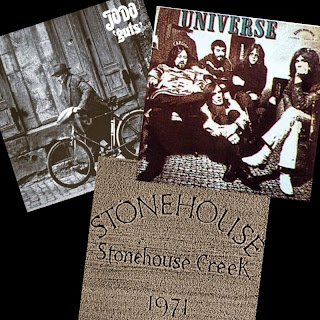 |
| A 1971 UK blues rock LP triumvirate of Jodo, Universe & Stonehouse |
The album begins with a plaintive ode to the mysterious "Stonehouse Creek", lamenting the loss of a well-loved local beauty spot, and then kicks off proper with the good-time bluesrock vibes of "Hobo". This fully establishes the band's tight skills; Ian Snow's funky drumming, Peter Spearings's nimble blues licks, Terry Parker's adventurous bass lines and Jim Smith's versatile wide-range vocal abilities. The second track is a real highlight of the album, "Cheater", with Jim's impassioned and brooding performance matching Pete's doom-laden blues riff.
"Nightmare" opens with Terry's quirky, slightly proggy bassline, and this is the first track to include some light piano embellishment, the inclusion of which Jim will voice his minor grievances on later in the interview. Personally speaking, although piano can generally take the edge off hard rock, I like it on this album. It's well played, not over-powering, and it suits an LP which has a good-natured, fun vibe over-all.
Toward the end, "Don't Push Me" introduces some great Sabbathian, progressive riffing. "Topaz" is a compact, groovy instrumental, perfect for those that like Led Zep's "Moby Dick" but tend to reach for fast-forward at a certain point; this one is drum-solo free haha. Along with the earlier track "Ain't No Game", "Four Letter Word" delves into deeper lyrical subject matters, supporting tolerance and anti-war sentiments. The album reprises nicely with Stonehouse Creek pt2, coming back full circle to the homely pleasures of hanging about fishing on a lazy summer afternoon.
Interview with Jim Smith
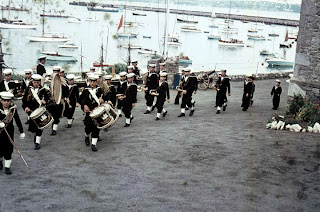 |
| Parade at British Seaman's Boys Home, Brixham Acquired from bsbhbrixham.org |
Jim: I was brought up in Devonport, in quite a large family, one of ten brothers and sisters. We lived in a very poor part of town. When I was seven, me and three brothers were out playing in the street and this car turned up. We were given all these really lovely clothes to put on, nicer than we'd seen before. We were whipped of to Brixham, in Paignton, Devon.
To my surprise we were taken to an orphanage and just left there. I found out six months or so later that my mum was really ill, dying of cancer. My father was in the Navy at the time, on HMS Ark Royal, so he wasn’t in a position to look after us all. The rest of my siblings were staying with grandparents and other family. It was a naval orphanage and they had bands, so at the age of twelve I joined a naval band, as a side drummer, also playing the bugle. [The British Seaman's Boys Home (link) was open for 125 years between 1863 and 1988]
Me: Drumming was your first love?
Jim: Yes, I seemed to have a natural aptitude and picked things up and played them quite easily in the boy’s marching band.
Me: How did that develop into playing in rock bands?
Jim: At around fifteen I had the chance to leave the orphanage, and go and live with my sister in Plymouth. I joined a little youth club come boxing club, which used to put on dances. A couple of guys there asked me if I’d like to join in getting a band together. I managed to get a cheap drum-setup, first time having been on a full size drum kit. I started picking things up from there, playing along to things like The Shadows, and it developed from there.
Me: Was one of those people Pete Spearing?
Jim: No, I met him when I was seventeen or eighteen. I played in loads of different little bands, not yet being really good at my trade. I could play a basic 4/4 but that was about it. I was never trained in music, I didn’t learn to read music. My skills developed just by studying other musicians, I used to go home and work it out bit by bit in my own time. When I was about sixteen I was playing in a band at a show, in a cinema in Devonport, Plymouth. We were supporting The Who. When you see old pictures of The Who, Roger Daltrey’s wearing like a double-breasted jacket with stripes on it. That’s what he was wearing that night.
We even went to Germany for stint to play in Hamburg and that circuit, soon after the Beatles. Another time we got a residency in the Butlins holiday camp at Minehead, Somerset. To be allowed to work there, we had to officially become Red Coats, that was a lot of fun as you can imagine!
 |
| Pete Spearing, 1971 |
Jim: Believe it or not, I can't remember! Going back fifty years or so, the memories get murky. At that time it might have been “The Crusaders”, something like that. I was getting quite good on the drums, having been playing regularly in little social clubs and youth clubs. When I was about seventeen Pete Spearing [Stonehouse guitar/song-writer] approached me. By this time I had started to do some singing as well as the drums. He asked If i’d be interested in singing for a good three-piece band (drums, bass, guitar). Terry Parker [Stonehouse bass] was living in a place called Southway at the time. As you can hear on the album, he was a very accomplished bass player for a guy his age.
Me: So Stonehouse was initially Pete Spearing’s idea? Did you know Terry or Ian Snow [Stonehouse drums] before this point?
Jim: Stonehouse was Pete’s vision, it was all his material, he was such a prolific song-writer. I didn’t know Ian or Terry beforehand, no.
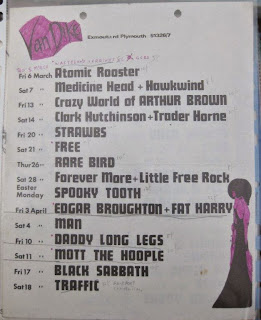 |
| Van Dike club poster, 1970 |
Jim: We didn’t want to sound like anyone else and I think we managed to achieve that, with my vocal range and how I sounded, and the way we played, I think we were really original. Personally speaking, I idolised Free. I saw them half a dozen times when they came down to Plymouth, at a club called the Van Dike. They were going on stage with 200 watt Marshal PA systems, that’s how new they were to the game as well!
Me: Paul Rogers has one of the best voices of all time. On that record he did with Queen in recent times, his voice was as good as ever.
Jim: Yeah, that was incredible. That’s the good thing about carrying on doing what you do, you should never lose it. He still has such a good vocal range.
Me: Why did you choose the name Stonehouse? Having looked it up, I see there is a place with that name in Plymouth.
Jim: Pete Spearing was born around that area. There’s a place called Stonehouse Creek, they keep boats down there. There’s a ha'penny bridge, where in the old days, seventeenth and eighteenth century, people used to pay a ha'penny to get across. It’s quite a biggish bridge, it takes two lanes of traffic now. So Pete themed one of the songs on Stonehouse bridge, and creek.
Me: Sure, the intro and outro on the album, containing the lyric, “They’re filling in Stonehouse Creek”.
Jim: And they did fill it in! One side of it is now a car park for a university college.
Me: I guess that was quite an upsetting thing at the time, which is why Pete wrote about it?
Jim: Yes! It was well-loved, lots of people used to go fishing around there and just laze around the edges of the water, having picnics and things like that.
Jim: Not really no, we did a lot of one-off club nights by ourselves. Speaking again of Paul Rogers again, I did measure myself on him, not the way he sang, but the way he stood on stage, the way he used the mic stand, he used it like a crutch. I used to do that and throw it about, it was like a baton to me.
Me: Were you just playing near Plymouth? Did you travel further, to London for instance?
Jim: Yeah we went to London; I forget the names of places we played now, one may have been the The Speakeasy (link). We went down an absolute storm, did really well and got more gigs. Don’t ask me what managers approached us, as Pete dealt with all that. We had a small spot at Glastonbury one time, set up in a tent, and that went down really well too. At one time we were voted one of the top ten bands in England, alas I can’t remember where or what that was in.
 |
| Command Studio, London |
Jim: Pete arranged that after talking to a label rep at a show, who thought we had a really good sound and liked what we did. An album recording session was arranged, but we only got one day in the studio.
Me: The album cover says it was recorded at Command studios in London (link) [which hosted the likes of King Crimson, Slade, Deep Purple, Atomic Rooster, PFM and Roxy Music]. In a small piece I found on-line (link), that was apparently written by Pete Spearing in recent times, he said that it was recorded at Advision studios. What is correct here?
Jim: It was recorded at Command studios, in 1970. Not Advision.
Me: The engineer, Barry Ainsworth, worked with some excellent bands; ├┤awkVVind , Deep Purple - "Hush", The Strawbs, May Blitz and Sam Gopal to name a few. [There is a 2016 video interview with Barry, here] Producer Mickey Clarke worked on Raw Material's second LP, and showing the bizarrely incongruous nature of the industry at the time, Rolf Harris's "Two Little Boys". He also produced a band called Room, from Dorset, not too far from Plymouth (See Vol60). Their album, “Pre-Flight”, is another of my absolute favourites from the time, they did one album for Vertigo and broke up pretty much straight after as well. Do you know of them?
Jim: Oh really? I can’t say I know of Room, but yes it’s sad. We could have done more, If we’d had more time we could have laid more tracks down. The bass, drums and guitar tracks were laid down first, during which time I sang along in a booth, so I knew when the breaks were coming in, recording what would normally be a first-take of the vocal track. After doing that, Barry Ainsworth decided that all these first takes were good enough and we did not redo any of them.
 |
| Acquired from www.philsbook.com |
Jim: Oh absolutely, we were only in the studio for one day. But a day is 24hrs, we were in there for just twelve hours. That was all the time they gave us, so we had to get it done. Even Pete’s guitar work, his lead work, he only did that once. Never went over it again like you’d normally do, you might want put harmony solos on it etc. We were really racing against the clock, what with the time it took to set everything up as well, there was no time at all for the band to have any extra input or say in the recording, no time to develop anything further in the studio.
Me: Who played the piano on tracks like "Hobo", "Nightmare", "Down Down" and "Stonehouse Creek"?
Jim: The piano was put in at a later date, without asking us, so I don’t even know who did it or who’s idea it was. It softened the band a little bit. I would have preferred it if they’d asked Pete to come back in to lay down some more rhythm tracks, and maybe some more harmony tracks.....but nothing.
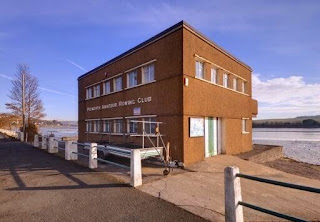 |
| Plymouth Amateur Rowing Club |
Jim: Oh absolutely, we had a place on the embankment in Plymouth, it was in a boat club. They had the rowing boats downstairs in one big room and we had quite a large upstairs room. We rehearsed there four or five times a week, all our gear was left there. The band was really tight, what you hear on the album is what you would have heard if you’d seen us live, although live it would have all been a lot louder and a lot fuller. There were no mistakes at all, we just played straight through the songs.
We’d go to rehearsal and bang out all the songs you know, plus other material as well. We did a thing called the “War Suite”, written by Pete, something along the lines of “War Of The Worlds”, but this was about WWII. That was just a beautiful piece of music. If we’d got anywhere, he’d have become a really good song writer, an arranger of songs, it’s such a shame. Not that he isn’t a good song writer now, but if we’d got somewhere when we had the break back then, you know.
Me: The War Suite sounds like it must have been some kind of prog rock epic. If it was never recorded, that was a tragic loss. I imagine you would not have been able to fit it on the album.
Jim: Yeah absolutely, it was like something Meatloaf would do. We never recorded it, we used to play the whole thing through on stage, it was in seven or eight parts. There were so many ups and downs, peaks and troughs, loud and quiet bits, it was just absolutely lovely to play. Actually, a song that was on the album, “Ain’t No Game” [themed on the anti-war sentiment common at the time] could have been taken from the War Suite. I seem to remember that, but of course some things are hazy after all these years.
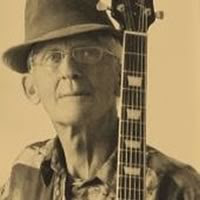 |
| Pete Spearing in more recent times |
Jim: Pete was the main guy, absolutely. We’d sit around discussing things and he’d accept and listen to any of our input, and we’d maybe add a bit here and a bit there, but basically, he was so good, it was like “if it’s not broken, why try and fix it?”, you know.
Me: How did he get that good, do you know? What was there in his past that might account for it?
Jim: I think intelligence. He’s a very intelligent man, he’s very knowledgeable. He’s read a lot, he’s word-perfect in everything he does and says and plays. He’s just good at it. Some people are good at writing, putting lyrics together, arranging songs, he has it all. He wrote all the lyrics as well.
Me: Do you have any favourite songs on the album?
Jim: I particularly like "Crazy White Folk" [Jim sings the chorus in perfect tune here] and "Ain’t No Game". I loved singing all of them, because my voice was so strong and I could reach all the notes. I still can actually, you wouldn’t believe it but my voice is still as high and as powerful as it ever was. Not bad for 68 is it, haha?
 |
| Ian Snow, 1971 |
Jim: Pete had his beloved Gibson, semi-acoustic it was. A couple of years ago he had it stolen, bless him. Terry Parker always used a Fender bass, and Snowy (Ian Snow) was on a Ludwig drum kit. The PA would have been whatever was hired in at the time.
Me: Did you contribute any drums on the album? I presume not, especially with the time constraints.
Jim: No I didn’t. At the time, I was the same type of drummer as Snowy, we were on a par for drums anyway. Though there was always a bit of camaraderie between us, Snowy was very good with a single bass drum and double bass, he could do the lot really.
Me: Do you know why Nighmare has echoey, distant vocals compared to rest of the album?
Jim: Yes that's right, it does. As far as I can remember, it was the producer's idea. He though it would suit the dark nature of the song and lyrics.
Me: I have the RCA Victor press of the album. on the back of the cover is printed a track list that is incorrect, it does not correlate with the record it contains. For instance, it says that Hobo is the first from last track on side B, but in reality Hobo is the second track on side A! The other even weirder thing is that the cover says "Move Away" is track four on side A. But that song is missing from vinyl all together! As it is on all the re-issues, which themselves don't mention Move Away, and print the songs in the correct order. Do you know what happened there? What might have caused that huge typo on the original pressing's cover, and even more importantly, what happened to the song Move Away? The label on the record is correct.
Jim: Unfortunately I can't shed any light on that, sorry! I haven't owned a copy of the original for many years, I lost mine when I was lending it to friends. Also, I have no memory of the song Move Away. Not in practicing or as part of the "War Suite". The only person who might be able to explain that is Pete Spearing, as he was the main song writer. Unfortunately I have dropped out of contact with him, although he did reappear around my way about five years ago which was the last time I saw him. He moves around a lot and has lived in Australia and elsewhere.
Me: Do you remember anything about the album being released? Reading about it or hearing it?
Jim: Nothing, no. They didn’t even let us know when it was being released, to be honest. I think there was something in the Melody Maker at the time.
 |
| Terry Parker, 1971 |
Jim: No, not from the Stonehouse album. At that time I don’t think radio played that sort of stuff, as far as I know, it’s not like now when you can hear everything you could want to hear, from any time.
Me: Did you have any involvement with the various re-issues that have appeared from time to time in recent years?
Jim: Nope, none at all. Nobody has ever contacted me, the first I knew about them was from seeing a CD on sale on Amazon, which was made in Germany I think. I often wonder if anyone has made any money from them and if I have any right to royalties. The problem is, back then I did not get involved in any of those details and I have no memory of what contractual rights I had, or might still have. If any of the band members do still have legal rights over the music, it would most likely be Pete. He dealt with the business side, and wrote the songs.
Me: Is it the case, as for some other bands I have spoken to, that by the time the album was actually released, the band was already on the rocks?
Jim: Yes, that’s right. I’d like to say, we didn’t split with any bad feelings. After all these years, I can’t honestly remember why we split, we never had a huge falling out, nobody hated anyone, we all got along really well, which for a rock band is really unusual. I can speculate that the pressures for Pete were strongest, he had recently married, had a baby girl, he would have had to spend a lot of time away from home, going to London etc. We did play a few gigs up north to promote the record, to audiences of about 200-300 people, which were well-received, as were all the shows we ever played.
Me: Was it 1971 when the band split?
Jim: I don’t remember exactly when, but it was 1971. As far as I know, we never got any money at all from the label. They didn’t promote us at all either, we had to go out and find our own promoters, which didn’t happen, for reasons that I don’t quite remember.
Me: Do you have any amusing or shocking Stonehouse stories to share?
Jim: Not really, it was so long ago now. What I mainly remember is spending all our time rehearsing. We looked the part, we all had long hair, we had the right stuff on stage.....we did get chased off out of a farmhouse once, by a guy with a shotgun! We pulled up there late one night, we wanted some water for the big van we had, and he thought we was trying to rob the place, we banged on the door and the next minute this shotgun came peering through the window at us, we thought “shit!” and just ran for it, loudly expressing our apologies as we high-tailed it out of there.
We were a well behaved band, we weren’t smashing things up, we didn’t get into trouble with anybody. We just played our music. Being good musicians was all we ever wanted.
-------------------------------------
And I think anyone who hears the album will be in no doubt that they certainly achieved that! Soon after Stonehouse, Jim and Ian joined a new band based in London, called Asgaerd (see Vol99), with whom Pete was also briefly involved at one point. More on this, and another band further down in Stonehouse history called Canyon, in part 2 of the interview later.
Thanks to Jim for making these interviews possible, and thanks for reading! Follow Stonehouse at the official Facebook page.
© Richard Sheppard / aftersabbath.blogspot.com / Stonehouse
Jim Smith drumming in Canyon, 2012.
TDATS social links
Share with:













Wow, great to read some info about this band. I too would love to know what happened to the song Move Away. Thanks for an interesting piece
ReplyDelete